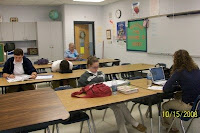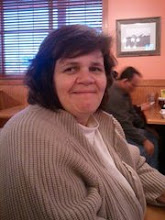
Today I paid a visit to the ACCESS lab at Mary G. Montgomery High School in Semmes. Another student from our class, Hannah Callais, accompanied me. We were greeted by Mr. Roger Rose who is in charge of the ACCESS program at MGM. He is currently teaching an online AP Psychology class using ACCESS. The ACCESS lab had about eight students in it, some from other high schools, doing online learning. They were studying different subjects such as Art History, AP Psychology, Literature and Statistics. While in the lab, the students are monitored by a program facilitator, Mrs. Brown, who keeps track of their progress.
Mr. Rose showed us around the lab and how the different equipment is used. He doesn't have an IVC (interactive video conferencing) class this term but he told us about it. Video is streamed from his classroom out to classes around the state of Alabama. He is allowed to have 29 students in each class but they can be from different locations. He can see the students and they can see him. Using this method, the instructor and students can interact live. Mr. Rose said this is almost as good as being in the classroom with one exception: he can't always tell if the students ar
 e "getting it" (understanding the material) because through the video stream you lose some gestures, non-verbal communication and nuances of being in the room with the students. Some students are also afraid to ask questions because they know they are on camera. Students are also able to take classes at MGM from instructors outside of the school using the IVC. It works both ways.
e "getting it" (understanding the material) because through the video stream you lose some gestures, non-verbal communication and nuances of being in the room with the students. Some students are also afraid to ask questions because they know they are on camera. Students are also able to take classes at MGM from instructors outside of the school using the IVC. It works both ways.There's also other tools used for the IVS: Smartboard whiteboard and ELMO (not the furry, red monster). ELMO is a visual presenter that allows documents, three dimensional objects and text to be viewed on the IVC screen. Everything Mr. Rose does on the boards shows on the screen. It looks similar to an overhead projector. Wow, there's so much technology that I didn't even know existed!
We also met three of the other ACCESS lab teachers: Mrs. LeGrone, who teaches Chemistry, Mrs. Stroud, who teaches Physics and Ms. Hart, who teaches German. They are currently teaching the online ACCESS courses, but may be doing some of the IVC teaching next semester. It was felt by all three teachers that in theory, the ACCESS program is a wonderful concept but in actuality, there's some kinks in the mix. The lessons they use are prewritten and sometimes they don't have access to them until the first day of class (little time to plan). They use the lessons and power points that came with the software that was purchased with the program. The teachers would like a chance to create some of their own material but unfortunately that would be too time- consuming and expensive. Another drawback is the way the program was set up, not all students enter it on the first day or sometimes even the first week. Getting all the students coordinated when they are at different stages in the quarter is difficult.
The good news is that, hopefully, by the end of the school year, all the high schools in Alabama will have fully equipped ACCESS labs with teachers trained to run them. I envision, with the right training, this will be an incredible opportunity for our children to take classes they never dreamed they could such as Russian or Chinese, possibly taught by a teacher on the other side of the state. This is an excellent program to prepare our students for college. So many of the college classes now have web-based elements or are completely on-line. I believe this will give them an advantage in the future.
Mr. Rose also said that eventually, ACCESS labs would also be implemented in the middle schools in Alabama. Here's hoping that that may someday make their way to the elementary schools, perhaps available to the fourth and fifth graders who have mastered basic reading skills. This would also be a great program to implement into the PACE (gifted students) program as a way to keep these children challenged and motivated to seek out new experiences. I can't wait to see what is in store for us as teachers with all the new technological innovations. It's going to be quite a ride!
side note: Mr. Rose also stressed something of extreme importance: if we as pre-service teachers are not technologically savvy, we better get technologically savvy before we graduate. Many of the school districts are now requiring their teachers to have websites and virtual learning labs. It's not the wave of the future- it is the here and now. He said when we compete for the teaching jobs, the graduates with the technological skills would probably be the ones to get the jobs. He suggested we find software (some of it is free) to help us become more technology oriented. I guess it is true-you can never stop learning.
Visit Mr. Rose's, Mrs. Stroud's, and Mrs. LeGrone's websites for some great ideas.


No comments:
Post a Comment